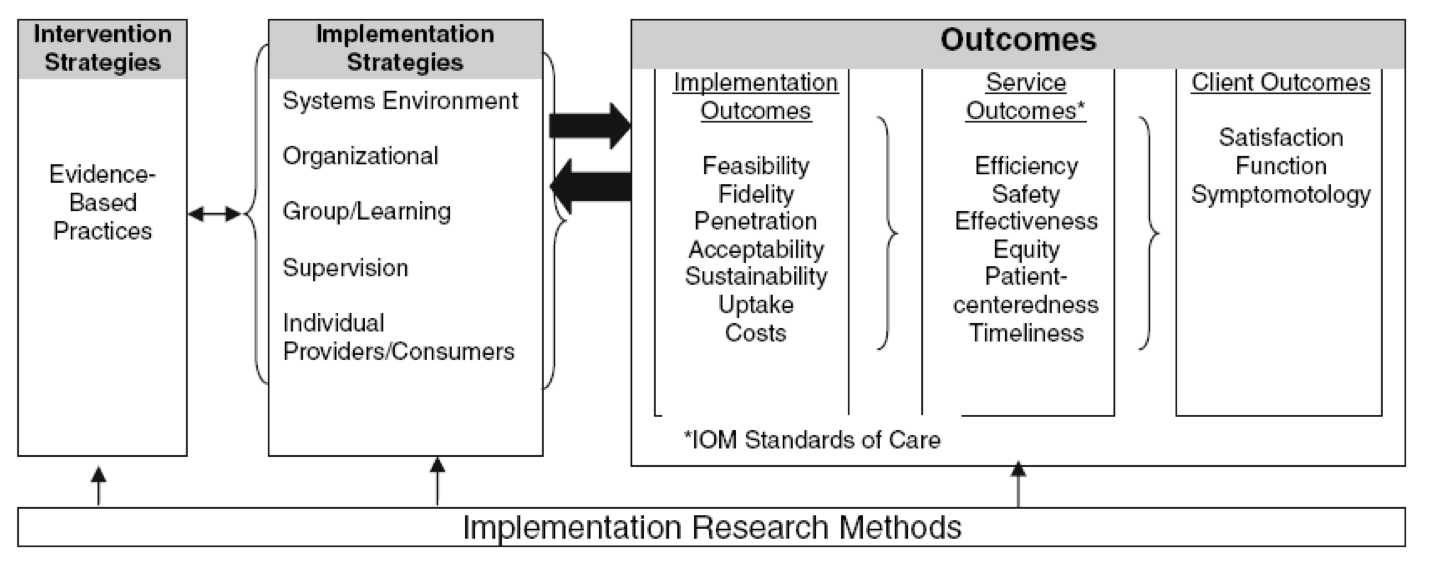Conceptual Model of Implementation Research
D and/or I:
 The focus on dissemination and/or implementation activities. D-only focuses on an active approach of spreading evidence-based interventions to target audience via determined channels using planned strategies. D=I, D>I, and I>D means there is some focus on both dissemination and implementation. I-only focuses on process of putting to use or integrating evidence-based interventions within a setting.
The focus on dissemination and/or implementation activities. D-only focuses on an active approach of spreading evidence-based interventions to target audience via determined channels using planned strategies. D=I, D>I, and I>D means there is some focus on both dissemination and implementation. I-only focuses on process of putting to use or integrating evidence-based interventions within a setting.
I-Only Socio-Ecological Levels:
 The level of the framework at which the model operates. Individual includes personal characteristics; Organization includes hospitals, service organizations, and factories; Community includes local government and neighborhoods; System includes hospital systems and government; Policy includes changes in policy.
The level of the framework at which the model operates. Individual includes personal characteristics; Organization includes hospitals, service organizations, and factories; Community includes local government and neighborhoods; System includes hospital systems and government; Policy includes changes in policy.
- Individual
- Organization
- Community
- System
Number of Times Cited:
 The # of times the original publication for the model was cited as indicated by Google Scholar since 2016.
The # of times the original publication for the model was cited as indicated by Google Scholar since 2016.
541 Field of Origin:
 The field of study in which the model originated.
The field of study in which the model originated.
Mental health Practitioner/Researcher:
 Whether the model is for the use of practitioners and/or researchers.
Whether the model is for the use of practitioners and/or researchers.
Researcher Rating:
 These are ratings given by users of the site.
These are ratings given by users of the site.
Constructs:
 Name of the construct developed by classifying/aligning the elements abstracted from models.
Name of the construct developed by classifying/aligning the elements abstracted from models.
Assessment Instruments:
- AHRQ Digital Health Equity Framework
- CFIR Interview Guide (Lam)
- CFIR Interview Guide (Zhao)
- CFIR Interview Guide Webtool
- Clinical Sustainability Assessment Tool (CSAT)
- Diagnosis Related Group (DRG) Policy Survey
- FRAME-IS Adaptation Tracking Instrument
- Implementation Climate Scale (ICS)
- Implementation Strategy Usability Scale
- Intervention Scalability Assessment Tool (ISAT)
- Iterative, Practical, Robust Implementation and Sustainability Model (iPRISM) Webtool
- Local Wellness Policy Implementation Checklist
- Longitudinal Implementation Strategy Tracking System (LISTS)
- Normalization Process Theory Interview Guide
- Normalization Process Theory Questionnaire (NoMAD)
- PRISM Interview Guide
- Partnership/Synergy Assessment Tool
- Policy Coalition Evaluation Tool (PCET)
- Program Sustainability Index
- RAPICE Protocol, Activity, and Interview Prompt Guide
- RAPICE Summary Template
- Readiness Thinking Tool - Observation Guide
- Readiness Thinking Tool - Survey
- Readiness for Recovery and Resiliency - Interview Guide
- Rehabilitation Policy Questionnaire
- Rutten’s Health Policy Questionnaire
- Stages of Implementation Completion (SIC)
- i-PARiHS Interview Guide
Citations:
 The original publication(s) of the model.
The original publication(s) of the model.
Proctor EK, Landsverk J, Aarons G, Chambers D, Glisson C, Mittman B. Implementation research in mental health services: an emerging science with conceptual, methodological, and training challenges. Admin Policy Mental Health 2009;36(1):24–34. Examples:
 Citations of studies that have used the model as an outline for their study.
Citations of studies that have used the model as an outline for their study.
Burn, Anne-Marie et al. “Evaluating the CYP-IAPT transformation of child and adolescent mental health services in Cambridgeshire, UK: a qualitative implementation study.” Implementation Science Communications vol. 1 89. 14 Oct. 2020, doi:10.1186/s43058-020-00078-6McGinty EE, Murphy KA, Dalcin AT, Stuart EA, Wang NY, Dickerson F, Gudzune K, Jerome G, Thompson D, Cullen BA, Gennusa J, Kilbourne AM, Daumit GL. A Model for Advancing Scale-Up of Complex Interventions for Vulnerable Populations: the ALACRITY Center for Health and Longevity in Mental Illness. J Gen Intern Med. 2020 Aug 31. doi: 10.1007/s11606-020-06137-x.
Murphy A, Rhodes AG, Taxman FS. Adaptability of contingency management in justice settings: survey findings on attitudes toward using rewards. J Subst Abuse Treat. 2012;43(2):168-177. doi:10.1016/j.jsat.2011.11.004
Tabak RG, Dsouza N, Schwarz CD, Quinn K, Kristen P, Haire-Joshu D. A formative study to understand perspectives of families eligible for a pediatric obesity program: a qualitative study. BMC Public Health. 2018 May 2;18(1):586. doi: 10.1186/s12889-018-5466-x
There are no reviews yet. Be the first one to write one.
